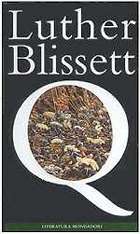Q (novel)

First edition (Italian)
|
|
| Author | Luther Blissett (nom de plume) |
|---|---|
| Translator | Shaun Whiteside |
| Country | Italy |
| Language | Italian |
| Genre | Historical novel |
| Publisher | Einaudi |
|
Publication date
|
1999 |
|
Published in English
|
2003 |
Q is a novel by Luther Blissett first published in Italian in 1999. The novel is set in Europe during the 16th century, and deals with Protestant reformation movements.
"Luther Blissett" was a nom de plume for four Italian authors (Roberto Bui, Giovanni Cattabriga, Federico Guglielmi and Luca Di Meo) who were part of the "Luther Blissett Project", which ended in 1999. They now write under the name Wu Ming.
The novel has been translated into Danish, Dutch, English (British and American), French, German, Greek, Korean, Polish, Russian, Turkish, Basque, Czech, Portuguese (Brazilian), Spanish and Serbian. All of the editions keep the original copyright statement, which allows for non-commercial reproduction of the book.
The book follows the journey of an Anabaptist radical across Europe in the first half of the 16th century as he joins in various movements and uprisings that come as a result of the Protestant reformation. The book spans 30 years as he is pursued by 'Q' (short for "Qoèlet"), a spy for the Roman Catholic Church cardinal Giovanni Pietro Carafa. The main character, who changes his name many times during the story, first fights in the German Peasants' War beside Thomas Müntzer, during which time he takes part in negotiations which are eventually formalised as the Twelve Articles. Following this, he battles in Münster's siege, during the Münster Rebellion, and some years later, in Venice.
Throughout Europe, several critics have read Q from a political point of view, and maintain that the novel is an allegory of European society after the decline of the 1960s and 1970s protest movements. As in the 16th century, the Counter-Reformation repressed any alternative theological current or radical social movement, and the Peace of Augsburg sanctioned the partition of the continent among Catholic and Protestant powers, so the last twenty years of the 20th century were marked by a vengeful rebirth of conservative ideologies, and the International Monetary Fund-driven corporate globalization of the economy seemed to rout any resistance.
...
Wikipedia
